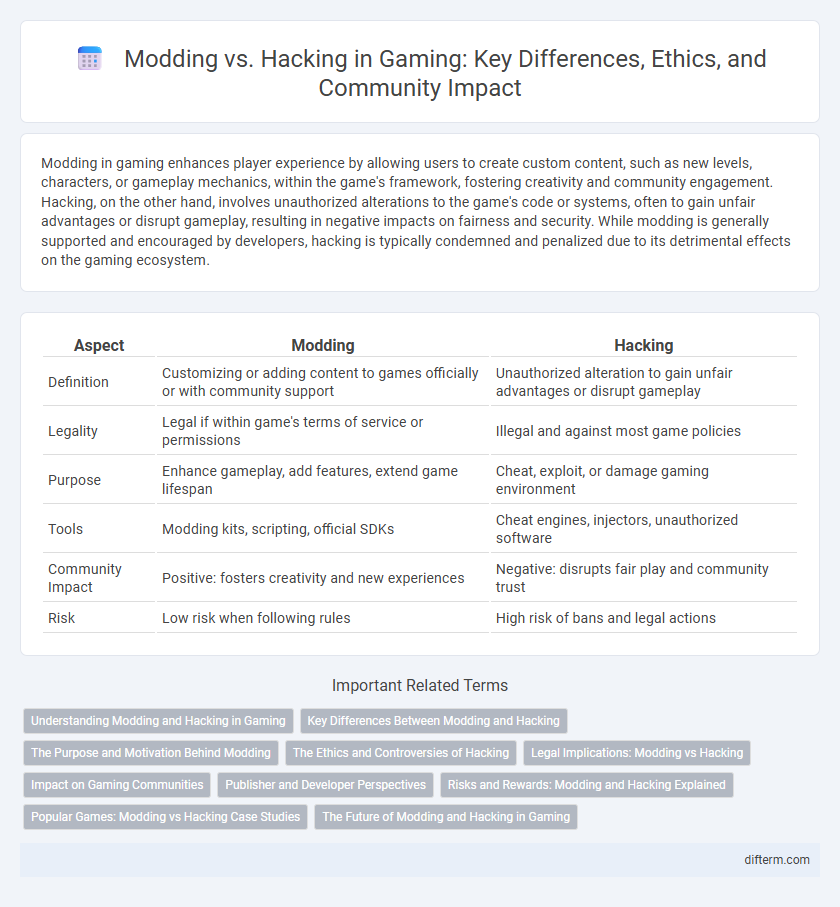Modding in gaming enhances player experience by allowing users to create custom content, such as new levels, characters, or gameplay mechanics, within the game's framework, fostering creativity and community engagement. Hacking, on the other hand, involves unauthorized alterations to the game's code or systems, often to gain unfair advantages or disrupt gameplay, resulting in negative impacts on fairness and security. While modding is generally supported and encouraged by developers, hacking is typically condemned and penalized due to its detrimental effects on the gaming ecosystem.
Table of Comparison
| Aspect | Modding | Hacking |
|---|---|---|
| Definition | Customizing or adding content to games officially or with community support | Unauthorized alteration to gain unfair advantages or disrupt gameplay |
| Legality | Legal if within game's terms of service or permissions | Illegal and against most game policies |
| Purpose | Enhance gameplay, add features, extend game lifespan | Cheat, exploit, or damage gaming environment |
| Tools | Modding kits, scripting, official SDKs | Cheat engines, injectors, unauthorized software |
| Community Impact | Positive: fosters creativity and new experiences | Negative: disrupts fair play and community trust |
| Risk | Low risk when following rules | High risk of bans and legal actions |
Understanding Modding and Hacking in Gaming
Modding in gaming involves players creating custom content or modifications that enhance gameplay, graphics, or features while respecting the game's rules and community guidelines. Hacking, on the other hand, refers to unauthorized exploitation or manipulation of game code to gain unfair advantages, often violating terms of service and risking bans. Understanding the ethical and technical differences between modding and hacking is crucial for fostering a positive gaming environment and supporting game developers.
Key Differences Between Modding and Hacking
Modding in gaming involves creating custom content or altering game features within the boundaries set by developers to enhance player experience, while hacking exploits vulnerabilities to gain unfair advantages or disrupt gameplay. Modders typically work with official tools or community-approved software, prioritizing creativity and customization without damaging game integrity. In contrast, hackers manipulate code or servers for cheating, causing security risks and often leading to bans or penalties.
The Purpose and Motivation Behind Modding
Modding in gaming is driven by players' desire to enhance gameplay, introduce new content, and personalize their experience without breaking game rules. It fosters creativity and community collaboration by allowing users to add features or fix issues while maintaining the game's integrity. Unlike hacking, which aims to exploit or gain unfair advantages, modding focuses on improving and expanding the game in ways endorsed or tolerated by developers.
The Ethics and Controversies of Hacking
Hacking in gaming often crosses ethical boundaries by enabling cheating, disrupting fair play, and compromising the security of game servers, leading to negative impacts on player communities. Unlike modding, which is typically sanctioned by developers and enhances gameplay through creative content, hacking exploits vulnerabilities for unfair advantages or malicious purposes. Controversies arise as hacking undermines trust and damages the integrity of competitive gaming environments, raising significant concerns among developers and players alike.
Legal Implications: Modding vs Hacking
Modding involves altering game content within the boundaries allowed by developers and often falls under fair use, whereas hacking typically violates terms of service and copyright laws, leading to potential legal penalties. Copyright infringement claims and breaches of the Digital Millennium Copyright Act (DMCA) are common legal issues associated with hacking. Courts generally differentiate modding as a creative extension from hacking, which is construed as unauthorized access or manipulation, subjecting hackers to civil or criminal prosecution.
Impact on Gaming Communities
Modding enriches gaming communities by enabling players to create custom content, enhancing replayability and fostering collaborative creativity. Hacking, conversely, disrupts fair play, often leading to toxic environments and undermining trust among players. The positive influence of modding promotes community growth, while hacking typically results in game bans and fragmented player bases.
Publisher and Developer Perspectives
Publishers prioritize modding as it extends a game's longevity and community engagement while maintaining intellectual property control, whereas hacking threatens security and disrupts fair play, leading to financial losses and reputational damage. Developers often support modding through official tools and APIs, enabling creative content that enhances gameplay, while actively combating hacking via anti-cheat systems and regular updates to protect the game's integrity. Balancing support for mods with stringent anti-hacking measures is critical to sustaining a healthy gaming ecosystem and ensuring ongoing user trust.
Risks and Rewards: Modding and Hacking Explained
Modding involves customizing game content to enhance user experience and creativity, often carrying minimal risk when done within official guidelines. Hacking, in contrast, manipulates game code or servers to gain unfair advantages, posing significant legal and ethical risks including bans and potential legal action. While modding can foster vibrant communities and prolong game lifespan, hacking undermines game integrity and player trust, leading to detrimental consequences.
Popular Games: Modding vs Hacking Case Studies
Popular games like Minecraft and Skyrim showcase the positive impact of modding, where player-created modifications enhance gameplay and extend game longevity through custom content and community-driven features. In contrast, hacking in games such as Call of Duty or Fortnite often involves unauthorized exploits that disrupt fair play, leading to bans and weakened player trust. Analyzing these case studies highlights how modding fosters creative engagement, whereas hacking undermines game integrity and developer efforts.
The Future of Modding and Hacking in Gaming
The future of modding in gaming promises enhanced creativity and community-driven content, supported by official tools and platforms that encourage safe customization. Hacking, however, remains a critical threat to game integrity, prompting developers to invest heavily in advanced security measures and real-time detection systems. Balancing innovation with protection will shape the evolving landscape of gaming ecosystems.
modding vs hacking Infographic

 difterm.com
difterm.com